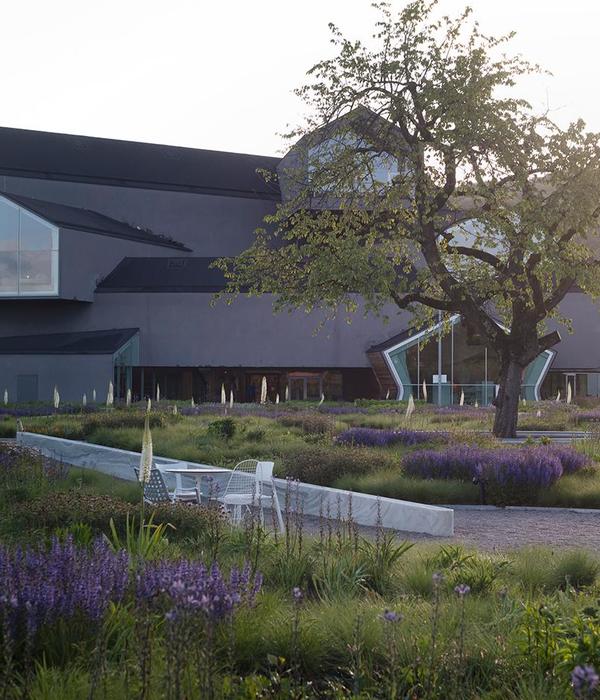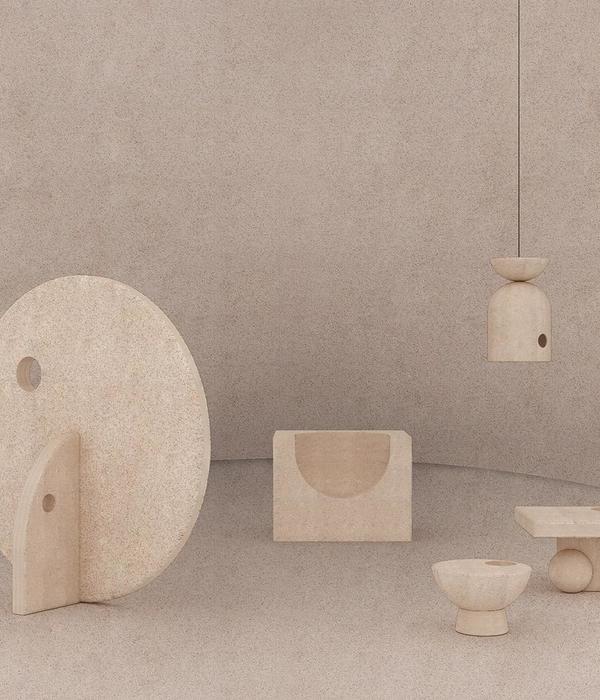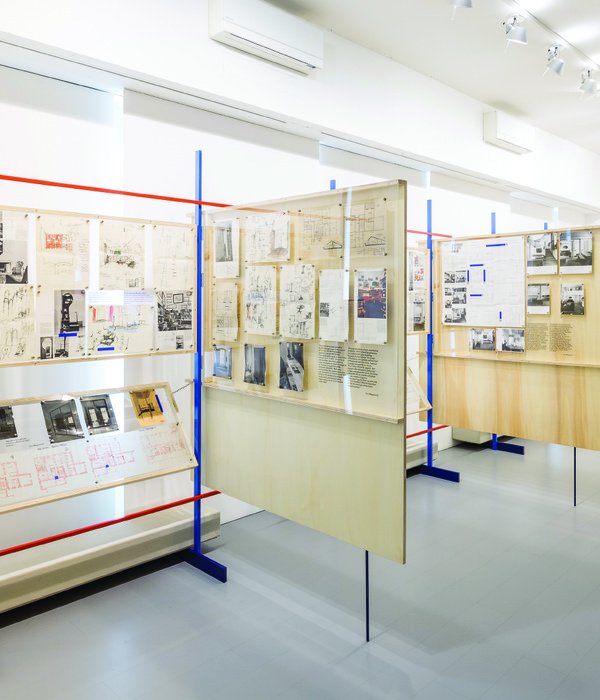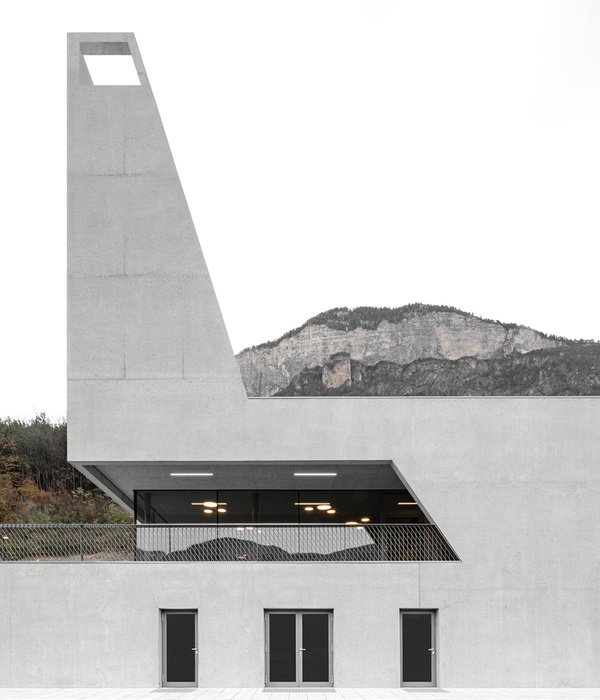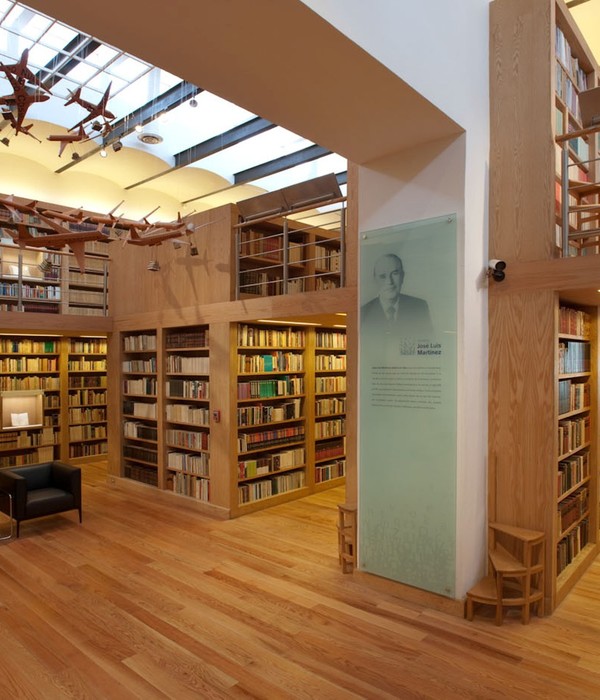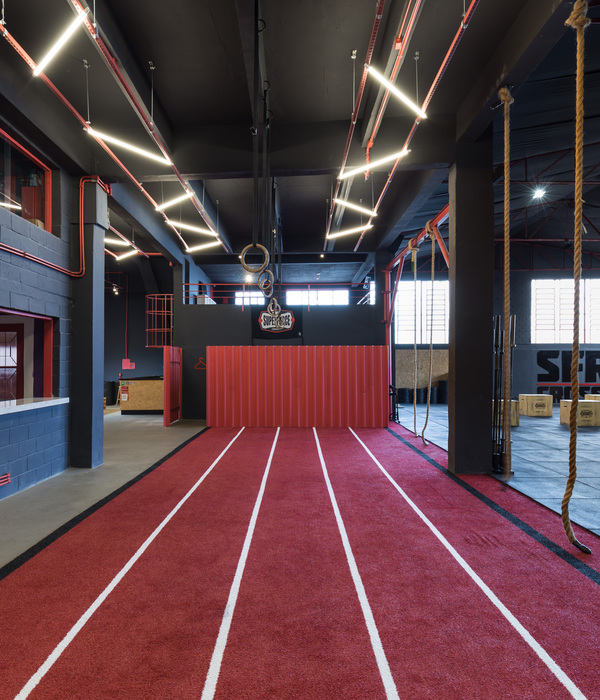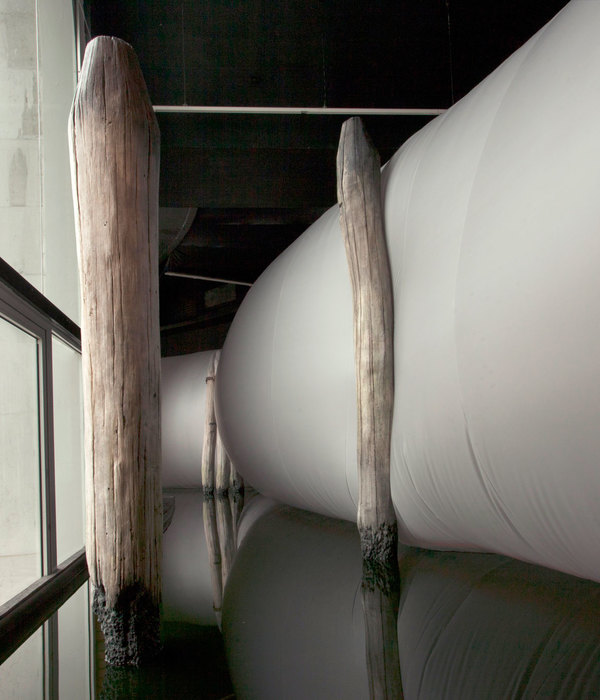- 项目名称:阿那亚金山岭艺术中心
- 设计方:上海阿科米星建筑设计事务所,庄慎,任皓,唐煜,朱捷
- 摄影版权:朱润资
- 结构设计:上海源规建筑结构设计事务所
- 机电设计:同济大学建筑设计研究院(集团)有限公司
- 幕墙设计:上海熙玛工程顾问有限公司
- 灯光设计:上海倘思照明设计有限公司
- 客户:承德阿那亚房地产开发有限公司
- 品牌:卫浴,科勒,TOTO,戴森
从场地而来的建筑
Conversation between the Building and the Site
山中的艺术中心坐落在一条山脊线上,位于自山脚蜿蜒而上的山道一侧,它承接着北方特有的苍茫山岭,也连接起从山脊线铺向另一侧山谷的社区。社区居民归来或访客前来,沿山路逶迤而上,会首先看到这个艺术中心。基地东侧和南侧面向山路,居高临下,可远望连绵群山;北侧俯瞰沿山坡铺陈而下的别墅群;西侧则紧邻社区边界——收束社区的街道。这特殊的位置让它成为社区入口标志与枢纽。
The art center in the mountain locates on a ridge line. It stands beside a winding path that starts from the foot of the mountain. It connects the typical boundless northern mountains, also the community in the valley on the other side of the ridge line. When residents or visitors go up along the winding path, this art center will greet them first. Its east and south sides face the mountain road below it, and enjoy a view to the continuous mountains. Its north side oversees the villas spreading down along the hillside. Its west side is next to the community and acting as an end of the street. Due to this special location, the art center is both an entrance landmark and a hub for the community.
▼项目鸟瞰,Aerial view of Art Center of Aranya, Jinshanling
▼阿那亚金山岭艺术中心夜景,Art Center of Aranya, Jinshanling- Bright stars in the night sky
小小的建筑如何成为面对大自然的一个不卑不亢的地标,又能够与社区街道的近人尺度协调融合,这是建筑场地设计要实现的目标。一片外观体量厚实的多边形单坡屋顶,一个与挡土墙结合包绕基地的基座,使建筑物面向群山有一个纪念性的尺度。同时,屋顶高度与倾斜方式的设计又能够使其在面向社区一侧收束成低矮立面,与社区别墅的尺度相近。
▼设计概念草图,Design concept sketch
整体环境中的建筑,The main building integrates with the surrounding environment
▼建筑主入口台阶,Main Entrance
▼东立面 ,East Elevation
▼小广场,Small Plaza
▼砖亭,Brick Pavilion
砖亭之亭
Sixteen Brick Pavilions
设计另一个要面对的问题是建筑与自然的关系,从山脚到这里的旅途一路兜转,人们已经饱览山色,如何在这个建筑里创造新的体验?
Another challenge is about how to tackle the relationship between the building and the nature. Visitors from the foot of the mountain have already enjoyed the full scenery, so how can we create a new experience in this building?
▼屋架与空间 ,Roof Frame and Space
15个各具功能的砖砌“柱亭”,共同组织出一个被覆盖的“大砖亭”。柱亭之间,风景在这里成为一种“邂逅偶遇”。沿途熟悉的风景和光线从柱体之间渗透进来,风景的画面被柱亭分割,会再次在人们的想象中联缀起来,成为一个新的体验。建筑空间以这样的方式来塑造定义周围群山的风景的同时,也塑造了建筑的内部性。敦实的系列砖亭形成建筑的特征,为外部提供了有意思的视觉和包容温暖灯火的空间印象。
▼空间格局模式,Spatial pattern mode
▼最终的空间形态格局,The final spatial form pattern
▼设计概念草图—风景与室内空间,Design concept sketch – Landscape and interior
The 15 brick pavilions of various functions are organized together to form a large covered brick pavilion. Between the pavilions, the experience to the surrounding landscape becomes an ‘encounter’. The complete landscape is divided into fragments by the pavilions, and then linked together in the imagination. This technique of interrupting and disrupting the whole creates a special viewing method to the surrounding mountains, at the same time it sculpts a special “interioriality”. The solid brick pavilions form the character of the building, providing an interesting visual and spatial impression of the exterior.
室内空间,Interior Space
▼内部和外部之间没有明确的界限,There is no clear boundary between the interior and exterior
▼“柱亭”之中的通道,The passage in the “column pavilion”
▼展览区域,exhibition area
这些砖亭,有的是入口亭,有的是两个空间之间的转换亭,有的是可以休息的读书空间,有的是儿童亭,有的是望山亭,有的是电梯,有的是楼梯,有的是辅助用房,有的是卫生间。室内空间被这15个砖亭分为三个区域:入口与服务、休息和咖啡区域、大的活动空间以及其辅助活动空间,其他空间围绕中央活动空间布置。不同尺度的空间被组合在一起——既提供两三人交流的空间,又提供集会活动的场所。“柱亭”本身与它构成的空间既是日常的,又是具有永恒意味的。
▼各砖亭平面、轴测图,Plan and axonometric drawing of each brick pavilion
砖亭使用效果图,Conception of the spatial use of each brick pavilion
The brick pavilions have different functions. They are reading pavilion, kids’s hut, viewing belvedere, entrance pavilion, staircase, lift, pantry room, and toilet. The interior space is divided by the 15 brick pavilions into three areas: the entrance and service area, the lounge and coffee area, the large event space and its auxiliary space. The other spaces are arranged around the central event space. The spaces of different scales are combined together – space for two or three people to interact, also larger space for gathering. The “pillar-like pavilion” and the space it forms are both everyday and eternal.
熟悉的风景变成一种相遇,Familiar landscape becomes an ‘encounter’
▼砖亭之亭与光影,Brick pavilion with light and shadows
▼概念模型,Concept model
▼总平面图,Master plan
一层平面图,First Floor Plan
概念设计时期的多义空间不同使用场景设想,Conceptual design period of different use of multi-vocal space
▼立面图,Elevation
▼剖面图 ,Section
▼各砖亭剖面图,Section of each brick pavilion
▼亭M详图,Detail of Pavilion M
▼亭L详图,Detail of Pavilion L
项目名称:阿那亚金山岭艺术中心
设计方:上海阿科米星建筑设计事务所/庄慎、任皓、唐煜、朱捷
公司网站:项目设计 & 完成年份:2018/02-2021/09主创及设计团队:庄慎、龚晨曦、邱梅、易宁、黎家泓、徐帆、张灏宸、李文伟(实习生)、梁俊(实习生)项目地址:河北省承德市
建筑面积:908平方米
摄影版权:朱润资
结构设计:上海源规建筑结构设计事务所
机电设计:同济大学建筑设计研究院(集团)有限公司
幕墙设计:上海熙玛工程顾问有限公司
灯光设计:上海倘思照明设计有限公司
幕墙施工:南方雄狮创建集团股份有限公司
土建施工:黑龙江省三江建设集团有限公司、承德宏盛建筑安装有限公司
客户:承德阿那亚房地产开发有限公司
品牌:卫浴/科勒、TOTO、戴森
瓷砖/宝瓷兰、SICIS
木饰面/SANFOOT
地毯/琅日
人造大理石/MARCONY
砖/富邦
Project name: Art Center of Aranya, Jinshanling
Design: Atelier Archmixing/ HUANG Shen, REN Hao, TANG Yu, ZHU Jie
Website:Design year & Completion Year: 2018/02-2021/09Leader designer & Team: ZHUANG Shen, GONG Chenxi, QIU Mei, YI Ning, LI Jiahong, XU Fan, ZHANG Haochen, LI Wenwei(Intern), LIANG Jun(Intern)Project location: Chengde, Hebei Province
Gross Built Area (square meters): 908 sqm
Photo credits: ZHU Runzi
Structural: Shanghai Wildness Structural Des. Firm Inc. (General partnership)Engineer: Tongji Architectural Design (Group) Co., Ltd.
Facade: Shanghai Ciam Façade Engineering Co., Ltd.
Lighting Design: Tungsten Studio
Facade Construction: South Lion Establish Group Co., Ltd.
Constructor: Heilongjiang Sanjiang Construction Engineering Co., Ltd.
Chengde Hongsheng Construction and Installation Co., LTD.
Clients: Chengde Aranya
Brands / Products used in the project:bathroom/KOHLER、TOTO、Dyson
ceramic tile/PORCELANOSA、SICIS
wood veneer/SANFOOT
carpet/TFC
Man-made marble/MARCONY
{{item.text_origin}}

